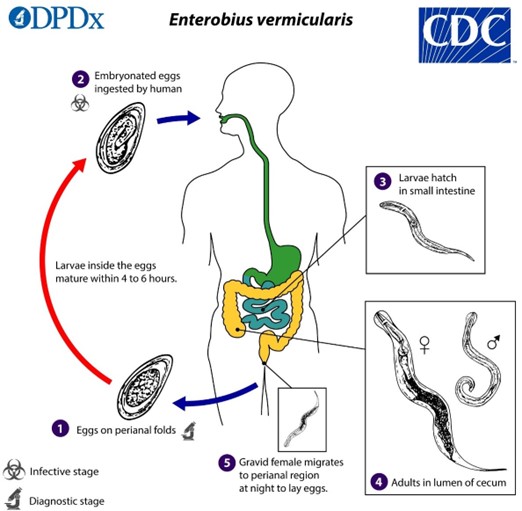A nurse is reinforcing teaching with the guardian of a preschooler who has a new diagnosis of enterobiasis.Which of the following information should the nurse include in the teaching?
a. "One dose of medication is all that will be necessary."
"Everyone who lives in the home will need medication."
"Allow the child to take tub baths instead of showers."
"Wash all clothes and bed linens in cold water."
The Correct Answer is B
b. "Everyone who lives in the home will need medication."
The nurse should inform the guardian that everyone who lives in the home will need medication when reinforcing teaching about enterobiasis. Enterobiasis, also known as pinworm infection, is highly contagious, and it can easily spread from person to person within the household. Treating only the affected individual may not be sufficient to eliminate the infection completely, as other household members may also be infected or at risk of reinfection.
Explanation for the other options:
a. "One dose of medication is all that will be necessary." Enterobiasis is typically treated with a medication regimen that involves taking multiple doses over a period of time. This is to ensure that all stages of the pinworm life cycle are targeted and eradicated. A single dose is usually not sufficient to eliminate the infection completely.
c. "Allow the child to take tub baths instead of showers." The choice of tub baths or showers does not directly impact the treatment or prevention of enterobiasis. Both methods of bathing can be used, but it is important to maintain good hygiene practices, such as regular handwashing and proper cleaning of the perianal area, to reduce the risk of reinfection.
d. "Wash all clothes and bed linens in cold water." While proper hygiene practices and laundering of clothes and bed linens are important in preventing the spread of enterobiasis, using cold water alone may not be sufficient. Washing clothes and bed linens in hot water (at a temperature of at least 60°C or 140°F) is recommended to kill any pinworm eggs that may be present.

Nursing Test Bank
Naxlex Comprehensive Predictor Exams
Related Questions
Correct Answer is A
Explanation
a. "The machine is programmed to prevent you from administering more than a safe dose."
When reinforcing teaching about epidural PCA (patient-controlled analgesia) with a client in active labor, it is important for the nurse to inform the client about the safety features of the machine. By explaining that the machine is programmed to prevent the client from administering more than a safe dose, the nurse reassures the client that they have control over their pain relief while minimizing the risk of overdose.
Option b, "During medication administration, you will not be able to move your legs freely," is not an accurate statement regarding epidural PCA. While epidural analgesia may cause temporary weakness or loss of sensation in the lower body, the ability to move the legs freely is not necessarily completely impaired. The degree of mobility can vary depending on the dosage and specific characteristics of the epidural.
Option c, "This method of pain control will shorten the second stage of labor," is not a valid statement. Epidural PCA is primarily used for pain relief during labor and delivery but does not directly affect the progression or duration of the second stage of labor, which involves pushing and the delivery of the baby.
Option d, "This type of anesthesia commonly causes a postpartum headache," is also incorrect. While headaches can occur as a potential side effect of epidural anesthesia, they are not specifically associated with epidural PCA. Postpartum headaches can have various causes and are not exclusively related to the use of epidural PCA.
By emphasizing the safety features of the machine and explaining that it prevents the administration of excessive doses, the nurse ensures that the client understands the appropriate use of the epidural PCA for pain control during labor.
Correct Answer is D
No explanation
Whether you are a student looking to ace your exams or a practicing nurse seeking to enhance your expertise , our nursing education contents will empower you with the confidence and competence to make a difference in the lives of patients and become a respected leader in the healthcare field.
Visit Naxlex, invest in your future and unlock endless possibilities with our unparalleled nursing education contents today
Report Wrong Answer on the Current Question
Do you disagree with the answer? If yes, what is your expected answer? Explain.
Kindly be descriptive with the issue you are facing.
